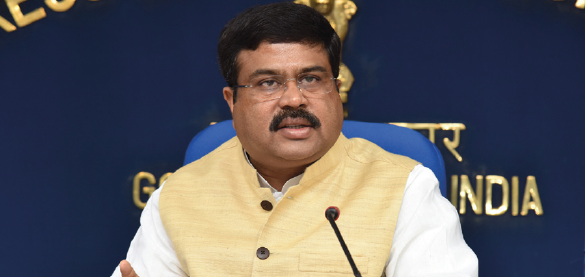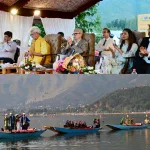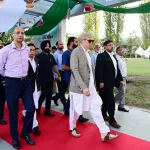Ganderbal, Aug 02: Union Minister for Education, Government of India, DharmendraPradhan, Saturday emphasised that universities must evolve from being mere academic hubs to becoming agents of innovation, social transformation, and civilizational rejuvenation.
“Universities are not just collections of buildings, but cultures, traditions, and sentiments, rooted in India’s historical and philosophical ethos,” DharmendraPradhan said, while addressing a high-profile gathering of Vice-Chancellors, senior bureaucrats, academicians, researchers, and students during the National Workshop on “NEP-2020 Implementation: Strategy, Synergy, and Sustainable Action Conclave of HEIs of J&K and Ladakh,” organised by the Central University of Kashmir (CUKashmir) at Tulmulla campus.
Sunil Kumar Barnwal, IAS, Additional Secretary, Department of Higher Education, Ministry of Education, Government of India, Shantmanu, Financial Commissioner and Additional Chief Secretary of the Higher Education Department, J&K, Prof. A RavinderNath, Vice Chancellor, Central University of Kashmir, Prof. Sanjay Kumar, Vice-Chancellor, Banaras Hindu University, Prof. Neelofar Khan, Vice-Chancellor, University of Kashmir, Srinagar, Prof. Binod Kumar Kanuaujia, Director NIT, Srinagar, Prof. Mohammad Mobin, Vice Chancellor, Cluster University Srinagar, Prof. SaketKushwaha, Vice-Chancellor, University of Ladakh, Prof. Pragati Kumar, Vice-Chancellor, Shri Mata Vaishnodevi University, Prof. K S Chandrasekhar, Vice-Chancellor, Cluster University Jammu, Dean Academic Affairs, Prof. ShahidRasool, Deans of Schools of various universities, faculty members, senior administrative officials were present on the occasion.
Calling Kashmir a “seat of civilizational wisdom,” he invoked the rich heritage of the region—from its contributions to ancient knowledge systems and philosophy, to its impact on Sufism, Buddhism, and Islamic culture. “This land has gifted spiritual reform and philosophical journeys to humanity,” he stated.
Encouraging universities to align education with societal needs, he shared an inspiring example of a local schoolboy who developed a carbon monoxide sensor for Kangri users in Kashmir. “If a schoolboy can innovate for his local conditions, why can’t a university professor?” he asked, urging universities to develop region-specific solutions and engage in research that tangibly benefits society.
Pradhan underscored the importance of inter-institutional collaboration, urging academic institutions to share best practices, conduct joint research, and work towards multidisciplinary innovation. He appreciated the efforts of the CUKashmir Vice Chancellor, Prof. RavinderNath, for hosting this significant event.
Earlier, Shantmanu, Financial Commissioner and Additional Chief Secretary of the Higher Education Department, in his presentation gave an overview of the region’s progressive efforts in reshaping higher education under the National Education Policy. The Education Minister also unveiled the new logo of the Central University of Kashmir.
He presented key data, noting that Jammu & Kashmir has nine universities, including two central universities, IIT Jammu, IIM Jammu, and over 150 government and private colleges, collectively catering to more than 3 lakh students. “With a Gross Enrolment Ratio (GER) of 24.8, J&K has emerged as one of the early adopters of NEP-2020, implementing the new curriculum structure from the 2022 batch onward,” he said. He emphasised the need for flexibility and reforms, stating that criteria would be relaxed to facilitate seamless implementation.
Highlighting innovations, he spoke about initiatives like the J&K Gyanodaya Express—a “college on wheels” concept that enabled experiential learning through national educational tours, and the “Design Your Degree” (DID) programme, now gaining traction nationwide. He lauded the learner-centric and skill-integrated approach being adopted across institutions in the Union Territory.
Speaking on the occasion, Sunil Kumar Barnwal, IAS, Additional Secretary, Department of Higher Education, Ministry of Education, Government of India, highlighted the unique nature of the NEP-2020, stating that it is not a conventional policy to be enforced immediately, but a dynamic and holistic vision document with long-term aspirations, chiefly to achieve a “Developed India by 2047.”
He stressed that the NEP calls for a paradigm shift in educational thinking—moving away from the traditional classroom-centric and teacher-led approach to a more learner-centric, flexible, and outcome-oriented model. “The focus is no longer just on teaching, but on learning—on the student’s journey to reach their full potential,” he said.
Acknowledging the varied pace of NEP implementation across institutions, he urged collaboration and mutual learning. Drawing from recent forums like the Vice-Chancellors’ Conference in Gujarat, he underlined the need for shared best practices and greater synergy among universities, especially at the state level.
In his address Prof. A. RavinderNath, Vice-Chancellor of Central University of Kashmir, presented a comprehensive blueprint for overhauling India’s higher education ecosystem through strategic planning, institutional synergy, and sustainable action. He unpacked the core concept behind the workshop theme—“Strategy, Synergy, and Sustainable Action”—framing it within the evolving framework of the National Education Policy (NEP) 2020. He stressed the urgency of Institutional Development Plans (IDPs) for universities as visionary, action-driven documents essential for meaningful transformation.
He outlined three critical enablers for successful implementation: Institutional Enablers (vision, purpose, SWOT analysis), Ecosystem Enablers (infrastructure, policy, stakeholder interaction), and Functional Enablers (academics, research, outreach). Prof. A RavinderNath, advocated internship-embedded curricula categorized into research, industry, and community-based internships, aligning with students’ aptitudes and future aspirations. Highlighting key policy reforms, he underlined the integration of the National Credit Framework, Academic Bank of Credits, multiple entry-exit options, and alignment with the National Higher Education Qualification Framework.
“The aim is to move from institutions being ‘temples of learning’ to becoming centres of excellence and innovation,” he asserted.
During the workshop, best practices of the CUKashmir and the IDP was shared with the participants. The Digital copies of the same are also shared with wider academic administrators for further discussions and implementation at their respective institutions.
In his welcome address, Dean Academic Affairs, Prof. ShahidRasool, described NEP-2020 as a comprehensive and a sacred document for transforming the educational landscape of the country.
“The complete implementation of NEP-2020 in the Education sector will play a pivotal and crucial role in achieving the Viksit Bharat @ 2047, as envisioned by the Prime Minister, Narendra Modi,” he further said. Prof. Shahid said CUKashmir has implemented the NEP-2020 in letter and spirit as it is imperative for the holistic and overall development of the students.
Thereafter, the Vice-Chancellors of all the participating universities presented the best practices adopted by their institutions and urged the participants to adopt them for the development of their educational institutions.
The Vice-Chancellors of the universities of Kashmir and Ladakh also signed a detailed joint Memorandum of Understanding which symbolized a deeper partnership in academics, research and institutional growth in the region.
Union Minister for Education, Government of India, DharmendraPradhan, later interacted with the Deans of Schools of the Central University of Kashmir and took a detailed review about the functioning of the university. ShriDharmendraPradhan hailed the student centric initiatives launched by the varsity. Later he also met the students of different departments and asked them to play their role in the making of Viksit Bharat @ 2047.








